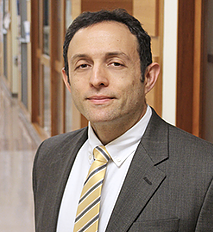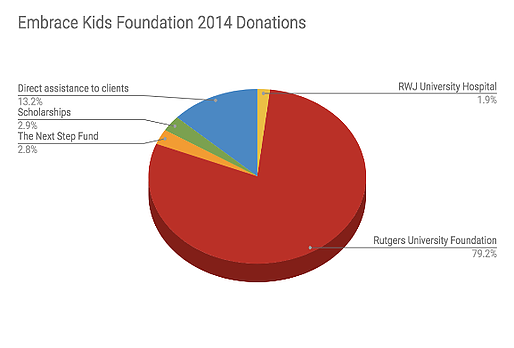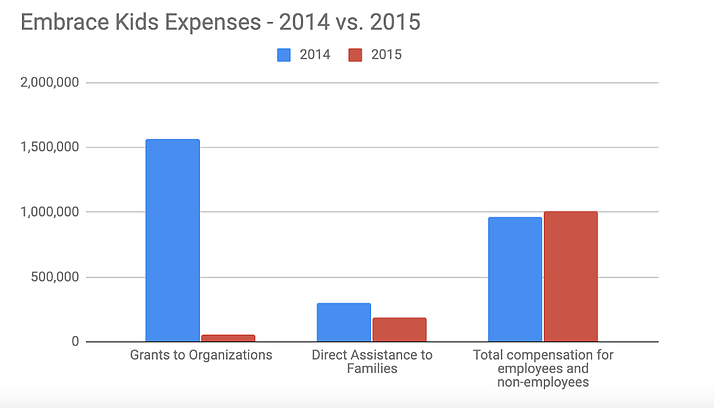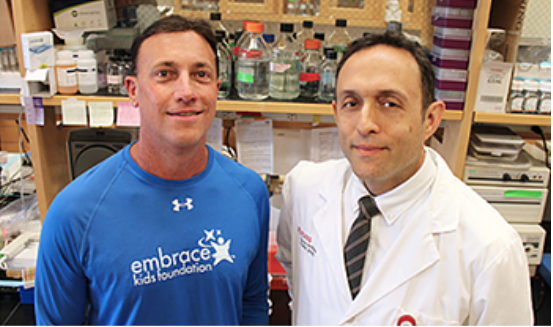The biggest individual cash donations from the Embrace Kids Foundation in recent years have gone not to directly assisting sick children and their families, but rather to funding cancer researchers at the Rutgers Cancer Institute of New Jersey and the Robert Wood Johnson University Hospital.

In 2014, the Embrace Kids Foundation established a prominent chair position to promote research endeavors that came with a high price tag.
The biggest individual cash donations from the Embrace Kids Foundation for the past few years have gone not to directly assist sick children and their families, but to fund medical doctors who conduct cancer research at the Rutgers Cancer Institute of New Jersey and at the Robert Wood Johnson University Hospital.
Since 2014, the Embrace Kids Foundation – recipient of all the money raised by the annual Rutgers University Dance Marathon – has donated or pledged $2.5 million to the Cancer Institute of New Jersey, largely to fund an endowed chair for Peter D. Cole, a widely-respected researcher in pediatric hematology/oncology.
Meanwhile, Robert Wood Johnson has received more than $1.2 million from Embrace Kids since 2011 for “cancer treatment,” according to the organization’s annual tax forms reviewed by a Rutgers student I-Team.
Embrace Kids Foundation Executive Director Glenn Jenkins says his organization jumped at the chance back in 2011 to meet a challenge of a $27 million anonymous donation to Rutgers to support 18 new endowed chairs for research at medical institutions, but that donor required the raising of matching funds for each of those chairs. Jenkins says he saw the opportunity to link one of those prestigious positions with Embrace Kids as a chance to solidify the impact the foundation could have through the support of research programs at medical institutions.
“For 26 years, Embrace Kids has exclusively supported two medical programs with major gifts: Rutgers Cancer Institute of New Jersey and Robert Wood Johnson University Hospital. The endowed chair was an opportunity to make a substantial investment in those two institutions and create a permanent fund for faculty development.”
These major gifts are not promoted when it comes to the overall mission of Embrace Kids as students participate to raise money under the guise of directly benefiting families. The endowed chair was created to propel cutting-edge research, in order to encourage further developments in precision medicine for pediatric treatment plans. The holders of these chairs join the ranks of the best faculty, and are held to a high standard.
To fill this role, the Embrace Kids Foundation selected Peter D. Cole, M.D, an esteemed leader in pediatric hematology/oncology.
“Embrace Kids played a big role in recruiting me and encouraging me to come back to Rutgers,” Cole said. “They created this endowed chair, and the support from that feeds into my research….They were really instrumental in bringing me back and encouraging me to expand our research efforts that was specifically focused on pediatric cancer and blood disorders.”
Drawn into the field while in medical school, Dr. Cole felt driven by passion for ever-changing laboratory science that brought about new developments in pediatric cancer. Enticed by the idea of treating a “whole family unit” instead of a singular patient, Dr. Cole finished his fellowship training at Memorial Sloan Kettering in New York in 1999 and was recruited to work at the Cancer Institute under the mentorship of Dr. Barton Kamen. Dr. Cole returned to Rutgers in summer 2018, after working in the Bronx for the past 11 years to fulfill his duties for the endowed chair established in Dr. Kamen’s memory. While Peter Cole was no stranger to New Brunswick, the program struggled in his absence when he left Rutgers Cancer Institute of New Jersey.
“There wasn’t any laboratory research in pediatric/oncology going on during the 11 years that I was gone,” he said.
Aside from his endowed chair appointment, Dr. Cole is currently the Division Chief of Pediatric Hematology/Oncology at Rutgers Cancer Institute of New Jersey and a professor in the Department of Pediatrics at Rutgers Robert Wood Johnson Medical School.
Despite Dr. Cole’s focus on keeping a connection to the “whole” patient and not the disease, any benefit families receive may not reach them in time.
“As I develop this research program and we start to develop results, the results will be used to improve care for patients with cancer, or lung disorders but the money doesn’t go directly to patients,” Dr. Cole explained.
The mission of Embrace Kids Foundation, as stated in its tax forms, is to address the spiritual, emotional and financial needs of patient families in the New Jersey/New York City metropolitan area. Major gifts for research might seem to some as peripheral to those immediate needs. Research is a tedious, long-term process with an expensive investment. The Embrace Kids Foundation committed a $1.5 million gift to help support the endowed chair position. Dr. Cole was clear that the money not only went to develop research but also to hire staff.

“It goes to support the whole research enterprise,” he said. “We have a lot of different research projects going on, including clinical trials. There’s another laboratory scientist who I’ve hired and she studies DNA repair mechanisms which are also very relevant to childhood cancer.”
The work Embrace Kids Foundation funding focuses on the side effects of treatment, some of which can be permanent. While Dr. Cole has discovered a few potential treatments that can reverse or hopefully prevent the side effects, there is no guarantee that the results of this research will be successfully implemented in clinical trials for the hundreds of families currently struggling through their children’s illness.
His lab is powered by grants from The National Institute of Health: $695,429 was granted for a clinical trial, with an additional $329,925 to conduct an animal study researching cognitive deficits in juvenile rats.
“The National Institute of Health funds the bulk of the workbench being done in my lab,” he said. “I’m using the Embrace Kids money for works supporting clinical research and expanding our research programs.”
While this work is important, the families working with Embrace Kids do not have time to wait for potential results, nor does the general public know that the bulk of funding raised through Embrace Kids is going to fund research. According to the donation breakdown for the 2014 fiscal calendar, only 13.2 percent of the money went directly to assist families. In the same year, the expenses exceeded the revenue for Embrace Kids Foundation. Deficit spending cost $1,231,594, forcing the foundation dive into its assets, spending $1.6 million in assets in order to afford the endowed chair. The revenue for the foundation was dropped to a mere $332,251.
In order to rebuild its assets the following year, the Embrace Kids Foundation spent considerably less money in direct assistance to families and donations to the Next Step Fund and Boston’s Children’s Hospital. Employees’ salaries, however, remained relatively stable, begging the question: is a non-profit sacrificing funds to families that it advertises as serving selflessly?

This paradox is exposed in the thousands of students that “sacrifice themselves” in order to fundraise and participate in 12-hour shifts for the Dance Marathon, under the assumption that one hundred percent of the donations are going to support sick children and their families. The reality is more like 25 cents for every dollar raised.

